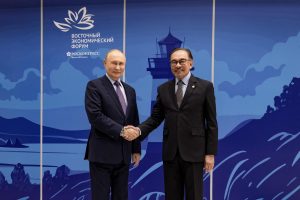Malaysia’s Prime Minister Anwar Ibrahim will today embark on a four-day state visit to Russia at the invitation of President Vladimir Putin, his second since taking office in late 2022.
In a statement yesterday, Malaysia’s Ministry of Foreign Affairs said that Anwar “will hold high-level meetings” with Putin and Prime Minister Mikhail Mishustin. These talks will “take stock of bilateral relations and advance cooperation in areas including trade and investment, agriculture and agri-commodities, education, aerospace, and energy,” according to the statement. The leaders “will also exchange views on regional and international developments of mutual importance” and “explore avenues to further deepen cooperation.”
On May 15 and 16, Anwar will then attend the confusingly named 16th International Economic Forum Russia – Islamic World: KazanForum in the central city of Kazan. Anwar will deliver a keynote at the forum, which describes itself as “the main platform for economic cooperation between the Russian Federation and the countries of the Islamic world.”
Anwar’s trip to Russia comes after a two-day visit to the country last year, during which he attended the Eastern Economic Forum in Vladivostok. During a sideline meeting with Putin, he praised the Russian leader’s “vision and leadership,” called Russia a “key partner,” and proposed the two countries forge a “special relationship.”
Prior to the visit, Anwar announced that Malaysia had submitted an application to join the BRICS economic grouping, which was reportedly the subject of discussions with Russian Foreign Minister Sergey Lavrov, who made a visit to the country in late July. In October, Malaysia was among four Southeast Asian nations that became partner countries of BRICS, which is fast emerging as an alternative to U.S.-dominated institutions like the G-7, from which Russia was expelled in 2014.
On one level, Anwar’s apparent warmth toward Russia and his pursuit of BRICS membership may simply stem from economic and foreign policy pragmatism: an attempt to establish equidistant relations with competing strategic and economic blocs. Malaysian officials have talked up the economic and trade benefits of BRICS membership, and have sought to avoid getting drawn into the proxy war between Russia, the United States, and the West.
In this respect, he is thinking along similar lines to much of the region. As Ian Storey noted in the South China Morning Post on the occasion of Anwar’s first Russia visit, he was only the sixth Southeast Asian leader to meet Putin since Russia’s invasion of Ukraine in February 2022, after his counterparts from Indonesia, Myanmar, Thailand, Laos, and Vietnam. Indonesia’s President Prabowo Subianto also met with Putin last July, three months prior to this inauguration. No Southeast Asian nation, barring Singapore, has imposed sanctions on Russia for its invasion.
In Anwar’s case, there may also be an added factor: a skepticism about the current U.S.-led international order. For the Malaysian leader, as for many other leaders in the Global South, the Western support for Israel’s bloody assaults on the Palestinians of Gaza has only underscored the unjust nature of the current international power arrangements. In his case, it has also involved efforts to support a more “balanced,” multipolar order in which Malaysia could play a more active role as a leader of both the Islamic world and developing nations writ large.
In a Facebook post Last June, Anwar argued that “while the world has evolved, general condescending attitudes and colonial mindsets persist.” But he also hailed the shifts in global distributions of power, saying that these indicated “a move towards a truly global perspective, where diverse voices and viewpoints are increasingly recognized and respected.”
Of course, in seeking closer ties with Russia, Anwar has been forced to sidestep any criticism of its aggression toward Ukraine, which, as my colleague David Hutt wrote last year, seems to jar with his passionate advocacy on behalf of the Palestinian cause. But for Anwar, this may be a cost worth paying for the wider geopolitical transition that he is set on encouraging.

































